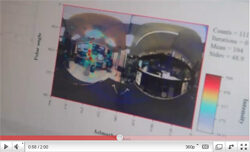Research News
-
Kids frequently exposed to imaging procedures that use radiation
Parents and doctors should educate themselves and be cautious about the frequent use of these diagnostic tests for kids.
-
Recycling waste heat into energy
The right material wrapped around your car’s exhaust system could one day scavenge heat that would otherwise be wasted, turning it into energy to warm the cabin or recharge the battery. That’s the work being done by U-M scientists using materials with the peculiar name skutterudites.
-
Do you live in a 'head' city or a 'heart' city?
Does your hometown display mostly “head” strengths, like intellect and creativity? Or is it more of a “heart” city, emphasizing social ties and kindness? U-M researchers Christopher Peterson and Nansook Park, who study the components of a meaningful life, say that many cities tend in one direction or another—and that affects citizens’ happiness, affluence and even politics.
-
Friends with cognitive benefits
You can improve your mental function simply by having conversations…but the tenor of the talking makes a difference. Turns out a friendly conversation helps, but once you turn competitive, the benefits dissolve.
-
Nuclear materials detector shows exact location of radiation sources
It’s an invention that could counter terrorist threats. A table-top gamma-ray detector created at U-M can not only identify the presence of dangerous nuclear materials, but can pinpoint and show their exact location and type, unlike conventional detectors which are not able to be as specific. Includes video.
-
Monarch butterflies use medicinal plants to treat offspring
When female monarchs are sick, they find plant “medicine” that will reduce infections in their offspring. Infected female butterflies prefer to lay their eggs on certain milkweed plants that will make their offspring less sick, suggesting that monarchs have evolved the ability to medicate their offspring.
-
Breakthrough: Scientists harness the power of electricity in the brain
A paralyzed patient may someday be able to “think” a foot into flexing or a leg into moving, using technology that harnesses the power of electricity in the brain, thanks in part to new breakthroughs by U-M researchers. Includes video.
-
Dirty hands, dirty mouths: U-M study finds a need to clean the body part that lies
Apparently your mom had it right when she threatened to wash your mouth out with soap if you talked dirty. Lying really does create a desire to clean the “dirty” body part.
-
Will your marriage last? Look at how you fight
The longevity of a marriage can be predicted by how a couple deals with conflict—or fails to. Are women’s fighting behaviors more destructive than men’s?










